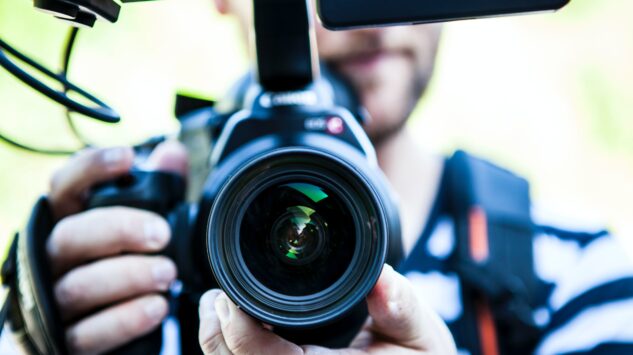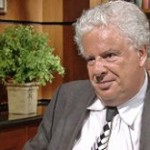Issue Briefs

Tribute to the great journalist Claude Salhani
Martin Sieff
August 17, 2022
When a Hezbollah suicide bomber drove a truck packed with explosives into the makeshift US Marine barracks in Beirut on October 23, 1982 and killed all 243 Marines sleeping in it, the great Reuters photo-journalist Claude Salhani was there. He worked with the rescue parties through the night trying to find and save survivors, pulling away the rubble with his bare hands.
That was Claude
That was Claude. The US Marines made him an honorary Marine and for the rest of his life he was always an honored guest at their ceremonial dinners at Quantico. He was also nominated for a Pulitzer Prize for his photo-coverage of the disaster.
On August 13, Claude passed away in Paris after a prolonged illness. He was 70 years old. Typically, the day before he died he was planning an indoor skydiving adventure with his beloved son Justin.
The world of journalism and wars is filled with fake heroes and frauds. Claude was The Real Thing. For half a century, he was the wisest, most courageous and honest of guides for American and European readers through decades of wars, invasions, scares, hysterias and countless policy bungles. He reported from at least 86 countries.
Dashing, dignified and courageous
Claude was handsome, dashing and dignified; but he did not look like a hero. He was lightly built, not tall though always impeccably dressed and distinguished. He was no fake-macho jerk: He was soft spoken and always courteous, charming and polite. Yet he had courage beyond imagining and he was indescribably tough.
During the terrible Lebanon civil war of the 1970s Claude was nearly killed when a 155mm Israeli heavy artillery shell demolished the Reuters building in Beirut while he was in it. He dashed down the stairs and got out, as the building crashed around him. He ran down the stairs so fast he did not realize until he was safely away he had sprained his ankle. The next day he went back and recovered the massive shell casing. He used it as an ashtray for decades afterwards.
Sharon’s shell, Arafat’s rescue
When Ariel Sharon, the Israeli defense minister who unleashed the bombardment of Beirut died, Claude was disappointed: It meant he could not fulfil one of his lifelong ambitions. He had waited for decades to meet Sharon face to face and say to him, “Ah! General Sharon. You tried to kill me with a 155mm artillery shell in Beirut: I still have the shell.”
On another occasion, an extremist Palestinian splinter group kidnapped Claude and tortured him imagining he was an Israeli spy. PLO Leader Yasser Arafat, who held Claude in high regard, learned of the abduction and sent emissaries who rescued him. People later asked Claude how terrified and traumatized he was when he was freed. He always replied, “I didn’t feel terrified or traumatized at all. I was free. I was alive. There’s no greater feeling than that.”
Fear and chance
Claude was no stranger to fear: Like all true heroes he recognized it, faced it and used it. After my own formative years covering the terror conflict on the streets of my native Belfast, I once asked him, “Did you ever in the worst years in Beirut have an instinct when to cross the street, or turn back, just before there was a killing or an artillery shell landed where you would have been?” He looked at me with his quiet piercing insight and said, “Yes. Always. Every time.”
Stay on the job
On another occasion, Claude had to have overdue painful dental work done, but the electricity supply for that region of the city had collapsed. The dentist kept interrupting his treatment to generate power on a bicycle-generator to keep the power drill going for a few more minutes. Through all of this, Claude stayed on the job.
The Iraq war
When President George W. Bush insisted on invading Iraq in 2003, the top editorial levels of United Press International, UPI, were filled with the usual fake experts and armchair generals who had never been in the Middle East in their lives and never been on the receiving end of a hostile artillery barrage, mortar round or rifle sight. Claude and I warned that the war would be a catastrophe and a fiasco and was being fought on fake premises, and we repeatedly wrote it in our columns. It did not endear either of us to any of the phonies, ignoramuses and fakes. We had already then 60 years of experience covering the region between us and they had none: And they knew it.
In Central Asia
Years later, Claude recommended me to join him and our fellow UPI reporting vet, the legendary Rick Tompkins, who had covered the Iranian Revolution and the Rwanda genocide, to set up a new news service covering energy developments in Central Asia. We were based in Almaty, now Nur-Sultan, the capital of Kazakhstan. Within weeks, Claude was an expert on the patterns of crime, protection and corruption in our building and through that entire neighborhood of the city.
Everything done well
Claude was the Willie Mays of journalism – He could – and did – do everything well. No news photographer covered the entire region so well, so widely and for so long. He effortlessly moved into analysis and senior editing and became a respected and highly influential columnist for a range of news organizations from the Arabian Gulf to Washington. Until his last illness he was opinion editor for the Arab Weekly. He published a first class thriller and important books on Islam and the Middle East.
I do not share the Conventional Wisdom to wish my dear friend that he Rest in Peace: He has a new Universe to Explore now.
 |
Martin Sieff is a Global Policy Institute Fellow. He is author most recently of Gathering Storm: The Seventh Era of American History and the Coming Crises That Will Lead to It. |